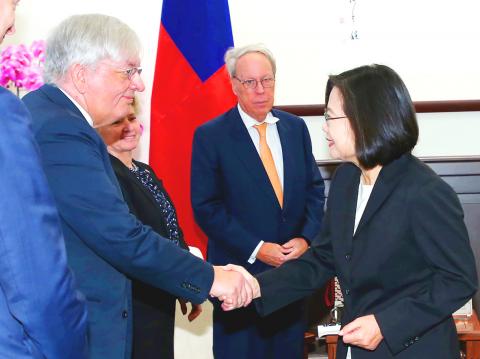Cybersecurity is directly linked to national security and is a top priority for the government, President Tsai Ing-wen (蔡英文) said yesterday at a meeting with a team of “white hat” hackers at the Presidential Office.
Cybersecurity “will not just be a slogan” for her administration, Tsai told the Taiwanese delegation to the annual DEF CON computer hacker convention, which was held from Aug. 9 to 11 in Las Vegas.
The government last year introduced the Information and Communication Security Management Act (資通安全管理法) and in September this year published its first annual report on the state of cybersecurity in the nation, she said.

Photo: CNA
The National Communications and Cyber Security Center has been active since its establishment last year, and the government has being training people who are experts in cybersecruity, she added.
The National Security Council and the Executive Yuan are working on an “information security strategy 2.0,” which would be rolled out from 2021 to 2025, she said, adding that the strategy involves cybersecurity training and information-security technology development.
Tsai said she hoped to develop national awareness about the urgency of information security and to build a solid foundation for the development of a digital economy.
She also met a delegation from New York-based non-profit organization the National Committee on American Foreign Policy.
The president told the delegation — which included former American Institute in Taiwan chairman Raymond Burghardt, former US ambassador Susan Elliott and Susan Thornton, a senior fellow at the Paul Tsai China Center of Yale Law School — that the US is Taiwan’s most important strategic and economic partner.
Taiwan will continue to use its advantages and strengths to highlight the nation’s role as a force for good in the world, Tsai said.

PREPAREDNESS: Given the difficulty of importing ammunition during wartime, the Ministry of National Defense said it would prioritize ‘coproduction’ partnerships A newly formed unit of the Marine Corps tasked with land-based security operations has recently replaced its aging, domestically produced rifles with more advanced, US-made M4A1 rifles, a source said yesterday. The unnamed source familiar with the matter said the First Security Battalion of the Marine Corps’ Air Defense and Base Guard Group has replaced its older T65K2 rifles, which have been in service since the late 1980s, with the newly received M4A1s. The source did not say exactly when the upgrade took place or how many M4A1s were issued to the battalion. The confirmation came after Chinese-language media reported

A Ministry of Foreign Affairs official yesterday said that a delegation that visited China for an APEC meeting did not receive any kind of treatment that downgraded Taiwan’s sovereignty. Department of International Organizations Director-General Jonathan Sun (孫儉元) said that he and a group of ministry officials visited Shenzhen, China, to attend the APEC Informal Senior Officials’ Meeting last month. The trip went “smoothly and safely” for all Taiwanese delegates, as the Chinese side arranged the trip in accordance with long-standing practices, Sun said at the ministry’s weekly briefing. The Taiwanese group did not encounter any political suppression, he said. Sun made the remarks when

The Taiwanese passport ranked 33rd in a global listing of passports by convenience this month, rising three places from last month’s ranking, but matching its position in January last year. The Henley Passport Index, an international ranking of passports by the number of designations its holder can travel to without a visa, showed that the Taiwan passport enables holders to travel to 139 countries and territories without a visa. Singapore’s passport was ranked the most powerful with visa-free access to 192 destinations out of 227, according to the index published on Tuesday by UK-based migration investment consultancy firm Henley and Partners. Japan’s and

BROAD AGREEMENT: The two are nearing a trade deal to reduce Taiwan’s tariff to 15% and a commitment for TSMC to build five more fabs, a ‘New York Times’ report said Taiwan and the US have reached a broad consensus on a trade deal, the Executive Yuan’s Office of Trade Negotiations said yesterday, after a report said that Washington is set to reduce Taiwan’s tariff rate to 15 percent. The New York Times on Monday reported that the two nations are nearing a trade deal to reduce Taiwan’s tariff rate to 15 percent and commit Taiwan Semiconductor Manufacturing Co (TSMC, 台積電) to building at least five more facilities in the US. “The agreement, which has been under negotiation for months, is being legally scrubbed and could be announced this month,” the paper said,